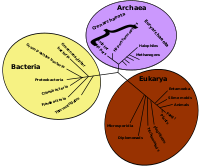
Photo from wikipedia
Abstract The provision of intergenerational care, via the Grandmother Hypothesis, has been implicated in the evolution of postfertile longevity, particularly in humans. However, if grandmothering does provide fitness benefits, a… Click to show full abstract
Abstract The provision of intergenerational care, via the Grandmother Hypothesis, has been implicated in the evolution of postfertile longevity, particularly in humans. However, if grandmothering does provide fitness benefits, a key question is why has it evolved so infrequently? We investigate this question with a combination of life‐history and evolutionary game theory. We derive simple eligibility and stability thresholds, both of which must be satisfied if intergenerational care is first to evolve and then to persist in a population. As one threshold becomes easier to fulfill, the other becomes more difficult, revealing a conflict between the two. As such, we suggest that, in fact, we should expect the evolution of grandmothering to be rare.
Journal Title: Ecology and Evolution
Year Published: 2017
Link to full text (if available)
Share on Social Media: Sign Up to like & get
recommendations!